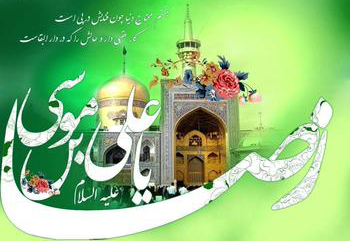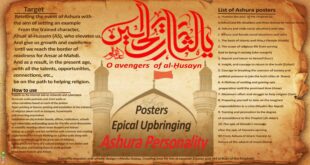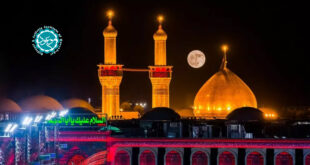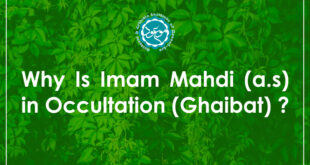Abul-Salt al-Harawi is quoted saying: “I never saw anyone more knowledgeable than Ali ibn Mousa al-Rida (A.S.). Every scholar who met him admitted the same. Al-Mamoon gathered once a large number of theologians, jurists and orators and he (al-Rida, A.S.) surpassed each and every one of them in his own respective branch of knowledge, so much so that the loser admitted his loss and the superiority of the winner over him.”20
He is also quoted saying: “I have heard Ali ibn Mousa al-Rida (A.S.) saying, `I used to take my place at the theological center and the number of the learned scholars at Medina was quite large, yet when a question over-taxed the mind of one of those scholars, he and the rest would point at me, and they would send me their queries, and I would answer them all.”21
In his discourse regarding the issue of succession, al-Mamoon said: “I do not know any man on the face of earth who is more suited (to be heir to the throne) than this man.”22
Al-Manaqib records the following: “When people disputed regarding Abul-Hassan al-Rida (A.S.), Muhammad ibn ‘Isa al-Yaqtini said, `I have collected as many as eighteen thousand of his answers to questions put forth to him.’ A group of critics, including Abu Bakr the orator in his Tarikh and al-Tha’labi in his tafsir and al-Sam’ani in his dissertation and in al-Mu’tazz in his work, in addition to others, have all quoted hadith from him.”23
After an intellectual discourse with al-Mamoon, Ali ibn al-Jahm said: “Al-Mamoon stood up to perform the prayers ritual and took Muhammad ibn Ja’fer, who was present there, by the hand, and I followed both of them. He asked him: `What do you think of your nephew?’ He answered, `A learned scholar although we never saw him being tutored by any learned man.’
Al-Mamoon said: `This nephew of yours is a member of the family of the Prophet (S.A.W.) about whom the Prophet (S.A.W.) said: `The virtuous among my descendants and the elite among my progeny are the most thoughtful when young, the most learned when adult; therefore, do not teach them for they are more learned than you are, nor will they ever take you out of guidance, nor lead you into misguidance.'”24
Ibn al-Athir writes: “He (al-Mamoon) discerned the descendants of Banu al-Abbas and Banu Ali and did not find anyone more than him (al-Rida, A.S.) in accomplishments, piety and knowledge.”25
We do not need the testimony of anyone to convince us of the distinction enjoyed by Emam al-Rida (A.S.) due to his knowledge over all others. Suffices us to review the books of hadith which are filled with his statements and dictation in various arts which every individual, regardless of the loftiness of his degree of knowledge, became dwarfed upon meeting him, feeling his inferiority and the superiority of Emam al-Rida (A.S.).
Ethical and Humane Conduct
Good manners constitute a significant part of one’s personality. They unveil the innermost nature of the individual, highlighting the extent of its purity of origin when it translates belief into action. The Emam was characterized by a most noble personality which won him the love of the commoners as well as the elite, by extraordinary humanity derived from the spirit of the Message itself one of whose custodians he himself was, a person who safeguarded it and inherited its innermost secrets.
Ibrahim ibn al-Abbas al-Suli is quoted saying: “I never saw Abul-Hassan al-Rida (A.S.) angering anyone by something he said, nor did I ever see him interrupting anyone, nor refusing to do someone a favour he was able to do, nor did he ever stretch his legs before an audience, nor leaned upon something while his companion did not, nor did he ever call any of his servants or attendants a bad name, nor did I ever see him spit or burst into laughter; rather, his laughter was just a smile. When he was ready to eat and he sat to be served, he seated with him all his attendants, including the doorman and the groom.” He adds, “Do not, therefore, believe anyone who claims that he saw someone else enjoying such accomplishments.”26
A guest once kept entertaining him part of the night when the lamp started fading and the guest stretched his hand to fix it, but Abul-Hassan (A.S.) swiftly checked him and fixed it himself, saying, “We are folks who do not let their guest tend on them.”27
Al-Manaqib states that al-Rida (A.S.) once went to the public bath-house and someone asked him to give him a massage, so he kept giving the man a massage till someone recognized him and told that person who that dignitary was. The man felt extremely embarrassed; he apologized to the Emam (A.S.) and gave him a massage.28
Muhammad ibn al-Fadl narrates the following anecdote regarding the Emam’s simple personality. He says:
“Al-Rida (A.S.), on the occasion of Eidul-Fitr, said to one of his attendants, `May God accept your good deeds and ours,’ then he stood up and left. On the occasion of Eidul-Adha, he said to the same man, `May God accept our good deeds and yours.’ I asked him, `O son of the Messenger of God! You said something to this man on the occasion of Eidul-Fitr and something else on the occasion of Eidul-Adha; why?’ He answered: `I pleaded God to accept his good deeds and ours because his action was similar to mine and I combined it with mine in my plea, whereas I pleaded God to accept our good deeds and his because we are capable of offering the ceremonial sacrifice while he is not; so, our action is different from his.'”29
Thus does Emam al-Rida (A.S.) become in total harmony with his message in the area of ethics, personifying the latter into action derived from the spirit of the message whereby he ascends to the summit of human perfection, rising thereby to the shores of the individual’s own real greatness. It is through this and similar means that the sincerity of faith and loftiness and dignity of the self are recognized.
Emam al-Rida (A.S.) defines for us the Islamic theory as the rules which govern the actual dealings of man with his brother man from which we can achieve the inspiration that Islam abolishes the then class distinctions among individuals and groups in the areas of public rights and the safeguarding of man’s dignity, and that the difference which we must recognize regarding these areas is the difference between one who obeys God and one who does not.
A man once said to the Emam: “By God! There is nobody on the face of earth who is more honourable than your forefathers.” The Emam responded by saying: “Their piety secured their honour, and their obedience of God made them fortunate.”30
Another man said to him: “By God! You are the best of all people!” He said to him: “Do not swear so. Better than me is one who is more obedient to God and more pious. By God! The following verse was never abrogated: `And We have made you nations and tribes so that you may know each other; verily the best of you in God’s sight is the most pious.'”31
Abul-Salt once asked him: “O son of the Messenger of God! What do you say about something people have been criticizing you for?” He asked: “What is it?” He said: “They claim that you call people your slaves.” He said: “God! Creator of the heavens and the earth, Knower of the hidden and the manifest! I invoke Thee to testify that I have never said so, nor did I ever hear that any of my forefathers had said so! God! You are the Knower of the many injustices this nation has committed against us, and this is just one of them…” Then he came to Abul-Salt and said: “O Abdul-Salam! If all people, as some claim, are our slaves, who did we buy them from?” Abul-Salt answered: “You are right, O son of the Messenger of God…” Then the Emam said: “O Abdul-Salam! Do you deny the right which God has allotted for us to be charged with the authority as others deny?” He said: “God forbid! I do acknowledge such right.”32
 Mouood Mouood English Edition
Mouood Mouood English Edition




